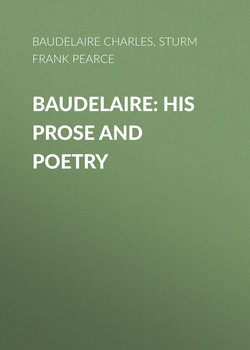Читать книгу Baudelaire: His Prose and Poetry - Charles Baudelaire, Charles Baudelaire, Baudelaire Charles - Страница 3
CHARLES BAUDELAIRE:
A STUDY BY F. P. STURM
I
ОглавлениеCharles Baudelaire was one of those who take the downward path which leads to salvation. There are men born to be the martyrs of the world and of their own time; men whose imagination carries them beyond all that we know or have learned to think of as law and order; who are so intoxicated with a vision of a beauty beyond the world that the world's beauty seems to them but a little paint above the face of the dead; who love God with a so consuming fire that they must praise evil for God's glory, and blaspheme His name that all sects and creeds may be melted away; who see beneath all there is of mortal loveliness, the invisible worm, feeding upon hopes and desires no less than upon the fair and perishable flesh; who are good and evil at the same time; and because the good and evil in their souls finds a so perfect instrument in the refined and tortured body of modern times, desire keener pleasure and more intolerable anguish than the world contains, and become materialists because the tortured heart cries out in denial of the soul that tortures it. Charles Baudelaire was one of these men; his art is the expression of his decadence; a study of his art is the understanding of that complex movement, that "inquietude of the Veil in the temple," as Mallarmé called it, that has changed the literature of the world; and, especially, made of poetry the subtle and delicate instrument of emotional expression it has become in our own day.
We used to hear a deal about Decadence in the arts, and now we hear as much about Symbolism, which is a flower sprung from the old corruption – but Baudelaire is decadence; his art is not a mere literary affectation, a mask of sorrow to be thrown aside when the curtain falls, but the voice of an imagination plunged into the contemplation of all the perverse and fallen loveliness of the world; that finds beauty most beautiful at the moment of its passing away, and regrets its perishing with a so poignant grief that it must needs follow it even into the narrow grave where those "dark comrades the worms, without ears, without eyes," whisper their secrets of terror and tell of yet another pang —
"Pour ce vieux corps sans âme et mort parmi les morts."
All his life Baudelaire was a victim to an unutterable weariness, that terrible malady of the soul born out of old times to prey upon civilisations that have reached their zenith – weariness, not of life, but of living, of continuing to labour and suffer in a world that has exhausted all its emotions and has no new thing to offer. Being an artist, therefore, he took his revenge upon life by a glorification of all the sorrowful things that it is life's continual desire to forget. His poems speak sweetly of decay and death, and whisper their graveyard secrets into the ears of beauty. His men are men whom the moon has touched with her own phantasy: who love the immense ungovernable sea, the unformed and multitudinous waters; the place where they are not; the woman they will never know; and all his women are enigmatic courtesans whose beauty is a transfiguration of sin; who hide the ugliness of the soul beneath the perfection of the body. He loves them and does not love; they are cruel and indolent and full of strange perversions; they are perfumed with exotic perfumes; they sleep to the sound of viols, or fan themselves languidly in the shadow, and only he sees that it is the shadow of death.
An art like this, rooted in a so tortured perception of the beauty and ugliness of a world where the spirit is mingled indistinguishably with the flesh, almost inevitably concerns itself with material things, with all the subtle raptures the soul feels, not by abstract contemplation, for that would mean content, but through the gateway of the senses; the lust of the flesh, the delight of the eye. Sound, colour, odour, form: to him these are not the symbols that lead the soul towards the infinite: they are the soul; they are the infinite. He writes, always with a weary and laborious grace, about the abstruser and more enigmatic things of the flesh, colours and odours particularly; but, unlike those later writers who have been called realists, he apprehends, to borrow a phrase from Pater, "all those finer conditions wherein material things rise to that subtlety of operation which constitutes them spiritual, where only the finer nerve and the keener touch can follow."
In one of his sonnets he says:
"Je hais la passion et l'esprit me fait mal!"
and, indeed, he is a poet in whom the spirit, as modern thought understands the word, had little or no part. We feel, reading his terrible poems, that the body is indeed acutely conscious of the soul, distressfully and even angrily conscious, but its motions are not yet subdued by the soul's prophetic voice. It was to forget this voice, with its eternal Esto memor, that Baudelaire wrote imperishablÿ of perishable things and their fading glory.
